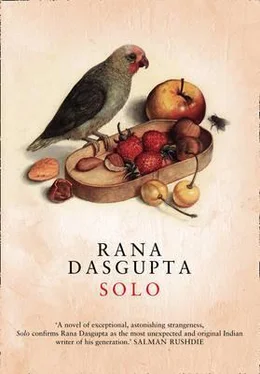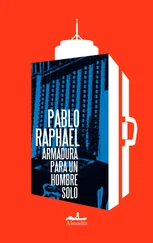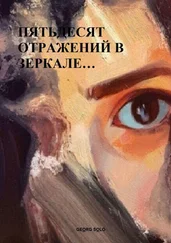The sun was dropping, and the shadows were long behind the headstones. In the distance, the funeral mourners stepped back for the filling in of earth, and Boris and Irakli watched for a moment.
Irakli said,
‘It’s strange: I can taste soil in my mouth.’
Boris played a funeral march quietly on his violin. Irakli inhaled the graveyard air. There was the faintest scent of flowers. He said,
‘Sometimes I’ve felt the exact sensation of death. It was like old wine from a cellar, and when it was over I wished it would return.’
Suddenly Boris remembered something. He put down his bow, reached in his pocket and pulled out a book.
‘I forgot: I bought this for you. It’s poetry. I picked it up in a bookshop and thought of you. She’s very famous in Ireland.’
Irakli opened the book and read from it. He read one poem, then he closed the book and put his hand on the cover. He looked up into the trees, which had lost all their leaves. It was cold, and the wind blew in gusts.
He pointed and said,
‘Look at that.’
A piece of videotape was unspooled in the branches. It was looped across the cemetery, passing from tree to tree. It shook in the wind, and glinted with the evening sun, and the untrapped lengths leaped and fluttered with inner life, like the ribbons of Russian gymnasts.
17
IT IS A GREY DAY when Ulrich goes to see the Woolworth Building. A long time ago, when he was in Berlin, he bought a postcard of this building — Tallest Man-made Structure in the World! — and he has always wanted to see the real thing. But today the summit is swathed in cloud, and the building does not have the anticipated effect.
He stands for some time, hoping for the clouds to lift. He has waited a lifetime, after all, and a few more minutes will not hurt. He looks at the gold script over the entrance — Woolworth Building — and the grand Gothic arches above. He hums a tune he used to know.
As he is standing there, motionless amid the Broadway swarm, he becomes aware of someone else waiting next to him. He looks round and sees it is Clara Blum. She is old, and quite stooped, but he recognises her at once.
‘Clara!’ he cries.
She smiles radiantly, and he stoops to kiss her cheek. He is amazed to see her again after so long.
‘What are you doing here?’ he asks.
‘I’ve come to see the Woolworth Building,’ she says, and he remembers the charm of her Czech accent.
‘You’ve never seen it before?’
‘This is the first time.’
Ulrich is astonished at this coincidence of time and place. There are so many things to ask he does not know where to start.
‘I recognised you immediately,’ he says. ‘You’re still beautiful.’
She smiles at his gallantry. He says,
‘How are you, Clara? What have you been doing? You became a chemist: I heard that. I heard you got married, too.’
‘True,’ she says, laconically.
‘I thought of you very often,’ he says, ‘after I left Berlin.’
She says nothing in response. She does not seem eager to speak of personal things. He says,
‘I lost touch with science after I left Berlin, and I never understood what it became. It was so far away from Sofia. What happened to everything we knew?’
The day is brightening, and all at once the sun breaks through. They both look up to see the top of the Woolworth Building. For a while they gaze at the ornate tower. Ulrich says hesitantly,
‘It’s big—’
‘But it’s not that big,’ finishes Clara, and suddenly they laugh with merry complicity. They look up again, and the building is quite ordinary, and this seems hilarious.
‘I imagined something far more,’ says Ulrich.
He is still laughing.
‘I don’t know what we were expecting,’ replies Clara. ‘It’s quite unimpressive!’
Ulrich feels relieved. It is wonderful to be together like this.
‘Shall we walk?’ he asks.
She leans on his arm and they wander slowly into the park, where businessmen are sitting around the fountain eating lunchtime sandwiches. They find a bench and sit down.
‘You always loved Einstein,’ says Clara. ‘Did you ever hear the story of his children?’
Ulrich wants to hear it. Clara says,
‘When Einstein was studying in Zurich, he fell in love with a brilliant Serbian student called Mileva. They were penniless: they lived together in a cramped apartment and worked on physics problems — and before long she was pregnant. You know what things were like in those days: Einstein was worried that a scandal might harm his career, and he sent Mileva away to the Balkans. While she was away, of course, he got his job in the Swiss Patent Office, and his fortunes were transformed.
‘Mileva had a little girl and she called her Lieserl. Einstein was excited to be a father but he couldn’t tell anyone. When Mileva came back to Zurich she was forced to leave their daughter behind.
‘And that’s the last anyone knows about Lieserl. Can you believe it, Ulrich? No one knows where she ended up, or whether she lived or died. Einstein was embarking on the greatest work of his life, and he was determined to keep his daughter a secret. And he did. The only trace of her was the melancholy she left behind in Mileva, who always spoke to her friends about the unhappiness of having no daughter.’
As Ulrich listens to the story, he thinks that he and Clara might have had children if events had been different. He wonders whether she ever had children of her own. He wonders whether she is speaking to him about the things that did not happen. He watches pigeons bobbing for crumbs.
‘Einstein and Mileva had two sons after their marriage, but over time their love turned bitter, and when he moved from Zurich to Berlin he left her behind. When you and I were in Berlin he was the most famous scientist in the world, but he suffered from an irrational fear that Mileva might bring him down. He agreed to give her the money from his Nobel Prize as a settlement in their divorce, but he could never bring himself to hand it over. He lost it in the Wall Street crash, and Mileva ended her days in poverty.
‘Poor Mileva had to take care of their musician son, Eduard, who was a schizophrenic. He had to be committed to an asylum, which she could hardly afford. Einstein only visited his son once, and he was horrified at what he saw. He didn’t want his scientific legacy to be tainted by it. He told everyone that Mileva was from degenerate stock, and had caused this madness all on her own. Einstein would have nothing to do with Eduard, and refused to respond to his letters.
‘Eduard was given insulin and electric shocks, and he attempted suicide several times. When his mother died, all the money for his care ran out, and he was placed in a pauper’s cell. When visitors came to see him he said he wished he could play the piano, but he had been told his playing disturbed the other inmates. He said he wanted to sink into absolute sleep, but the doctors had said it wasn’t sensible.’
‘Meanwhile Einstein was a celebrity in America,’ says Ulrich.
‘Quite,’ says Clara.
Clara’s story holds a revelation for Ulrich about his own life, but he needs some time before he can understand precisely what it is. For the moment, he is too moved by all that is happening.
‘Your story is making me sad,’ says Ulrich. ‘Let’s not be sad. It’s good to think of those old days. It’s good to find someone who knew me then. So much has happened since.’
Clara seems to agree, though she is strangely distant.
Smiling, he says,
‘I was never very good at chemistry, was I?’
‘No,’ she agrees.
‘I wanted so much to be good at it.’
‘You must have found other things to do with your life. You were always full of ideas.’
Читать дальше
Конец ознакомительного отрывка
Купить книгу












